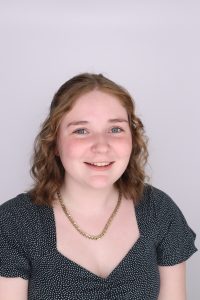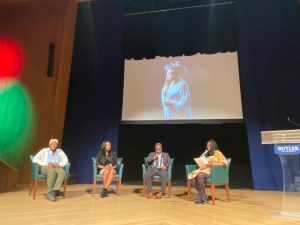Black and Jewish: The Lens of Filmmaking
by Samantha Plumridge, ’25

I feel so grateful I was encouraged to attend Black and Jewish as a part of the Black Diaspora: Faith and Expressions Seminar on Feb 26, 2024, as it was truly an experience like no other. As part of my internship with the CFV, I had the opportunity to learn about different faith-based communities and their experiences, and when Black and Jewish became an event I was able to attend, I was eager to go.
I personally never grew up around a Jewish community. Throughout my childhood, I was predominantly surrounded by Christian families based on the geographic location I was in, so I was excited to be able to attend an event to learn more about not just the Jewish culture, but also what it meant to be Jewish and a person of color.
When attending the seminar, we were first shown the film “Queen Esther”, which I soon learned was a common story in the Jewish tradition. This film was directed by Ira Mallory, who is an Indianapolis native and a Black man who follows Judaism. Along with him were Erreol Robinson and Paige Wells, who played the main characters in the film. After the film was shown, it was followed by a discussion. Early on in the seminar, I learned that Ira was originally brought up in the Christian tradition. He studied these beliefs until about 20ish years old when his mother died of cancer. Ira expressed that he felt angry at God for taking away his mom, which led him to explore the teachings of Judaism.
Through Judaism, he started to feel a sense of calm and peace, making the passing of his mother feel a little bit lighter to him. He created this film for his daughter to teach her about the stories of Judaism with more representation of people of color. This also allowed him to combine his two passions of filmmaking and Judaism. Listening to Ira talk about how he chose who to cast and who to work with was also very interesting. Since this film revolved around the story of women, he thought it would be best to not only have a cast but a crew that identified as women as well. This way, he felt as though the message of women’s empowerment was truly present.

Listening to Erreol and Paige talk about their roles in the film was also very interesting to hear. Erreol described her experiences as positive, along with being thankful for the people she worked with. A good portion of the crew members of the film attended the seminar. It was a delight to see their faces brighten up as people were engaging with the film and the conversation.
The seminar was a great way for me to learn about more of the Jewish culture but also more about the Black community. It was very insightful to learn how the presenters got to where they are today and the impact they are looking to have on people who watch the film and learn from their experiences.